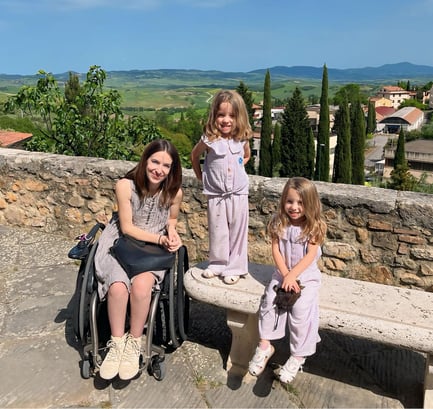I’ve written about pregnancy from my perspective as a paraplegic, but I’ve often wondered:

“What if I couldn’t use my arms?”
“How would I do this?”
I’m forever humbled by the abilities I have, just as much as I’m in awe of the mamas struggling alongside me who have more challenges of accessibility and logistics to overcome. I spoke to Daniela Schirmer Izzie (Dani), a quadriplegic and mother of 4-year-old twin girls, for her perspective.
- Tell me about your mindset around parenthood, before and after.
Parenthood before kids seemed like a problem to solve, or a series of limitations and challenges that would need solutions and adaptations given my disability. It turns out that all of that works itself out (even as a quadriplegic with twins as in my case!) The most important consideration has become providing and modeling for them the healthiest and best version of myself, while nurturing them with tons of love and interactive play.
- What is the biggest adaptation you’ve made as a disabled mama?
The biggest adaptation I have made to be a mom includes building an accessible “cooking station” in our kitchen island to maximize my comfort and ability to nourish myself and our kids. Plus, it is a great spot for us to bond and do some cooking activities together—an accessible way to play, learn, and interact through our food!
The other adaptation I want to mention are the developmental ones like practicing attachment parenting while also empowering my children to learn self-reliance, which blends very well with my lifestyle and considerations as a disabled mom. For example, my toddlers learned very early how to participate meaningfully with chores like putting their shoes and toys away (which has the bonus of maintaining wheelchair access to the floor space of our home), and with self-care like getting dressed (which allows me to be hands-off and use my voice to guide them instead.) We are raising great listeners!
- What has been your biggest disabled parenting win?
My biggest disabled parenting win has been raising two awesome little girls who understand disabilities, demonstrate compassion and respect for others, and are learning how to be adaptive in life themselves. We just took them on a trip to Italy, where my family lives, and I was amazed at just how adaptable they were, embracing the culture, language, and new ways of being in a foreign country. I couldn’t be prouder!

